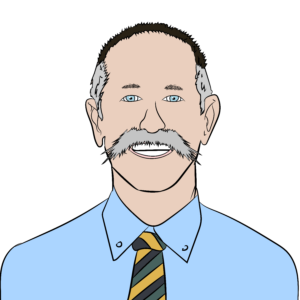Meet our teachers
Our teachers are highly skilled and experienced in their portfolios, bring with them a passion for people and innovation, and care about the education of our students.
- Home
- |
- Learning
- |
- Our teachers
- |
- Meet our teachers
- Home
- |
- Learning
- |
- Our teachers
- |
- Meet our teachers
Our teachers are highly skilled and experienced in their portfolios, bring with them a passion for people and innovation, and care about the education of our students.
Here, some of our teaching staff reflect on their life experiences in and beyond Trinity, which our students benefit from in their approach to the classroom every day.

Paul (Geography teacher and Head of Sutton House) on what “community” means to him
After 20 years of teaching at Trinity, the Trinity community also includes my own family; from my son who only just recently finished as a student, to my daughters who in the past have been involved with preparing choreography for Sutton House HPAF performances or making last minute props (for example gravestones for Michael Jacksons ‘Thriller’ back in 2015 – literally the night before the performance).
In fact, Sutton House is probably where I have some of my strongest links when it comes to the Trinity community.
I took over as Head of Sutton House in 2005 and since then I have seen hundreds of boys pass through. Being with these students on their journeys from Year 7 to Year 12 within Sutton, meeting their families at House events – House Breakfast and Chapel Services, HPAF and House Athletics (when it used to be on a Saturday) really did and does create that sense that we are a community within a larger community.
To me Trinity is a community, with smaller communities within a greater community. In my eyes this is what makes the school a special place to work and I hope a special place for all of the students, families, OTGs and staff connected with Trinity too!

Kate (English Techer, Co-Head of Year 12 and Teacher in Charge of Hockey) on what “sportsmanship” means to her
Sportsmanship to me is putting humanity ahead of the win.
This is best shown in the moments when you see an athlete consider their opponent as a fellow human being, rather than focussing on their own success. Think of John Landy and Ron Clarke, Ivan Anaya and Abel Mutai, Gianmarco Tamberi and Mutaz Essa Barshim.
In hockey we line up, look the rivals in the eye and shake hands before the game, as a tacit promise to the opposition that we will play fair.
Being a dignified winner shows as much respect to your opponents as being a gutsy loser. It’s important to play the game in such a way that makes it possible to share a choc milk and a donut with the other team after the match.
I love working with the fine athletes of the Trinity Hockey program, and am always impressed to see their acts of good sportsmanship.

John (Chinese language teacher and Head of Merritt House) on what “courage” means to him
In my early days in the army, when training for “hot extractions”, I was the last one into the helicopter and once I had done up my seatbelt, I was to give the thumbs up so the pilot could get us out of the situation. Although this was training, and not under fire, it was a competition between sections. I followed my team in, couldn’t get the belt done up, so, holding my belt, gave the thumbs up and we rose in the air in a rush of noise and screaming rotors. I salute the courage of those who display this courage every day as part of their service to others.
Although we hear ‘they displayed a lot of heart!’ usually in the context of a sporting match, displays of courage need not be physical. Recently we have seen two school Vice-Captains stand up before an assembly of their friends and teachers and share that they are gay. That has taken far greater courage than throwing one’s body at the legs of a hulking rugby forward or running backwards to take a mark!
Courage, an essential part of leadership, is standing up for your beliefs, regardless of the personal cost; it is placing the welfare and interest of others before your own; a courageous person is often on their own.
